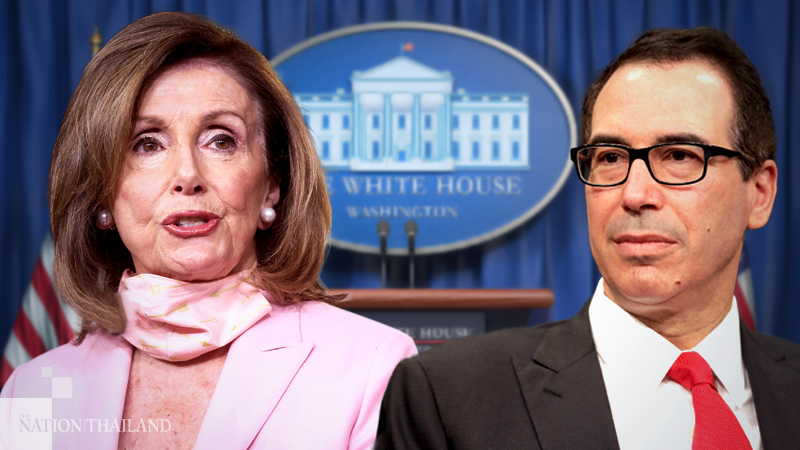House overwhelmingly passes bipartisan spending deal to avert government shutdown

WASHINGTON - The House overwhelmingly approved a bipartisan bill late Tuesday to keep the government funded through early December and avoid a shutdown just before the November election.
The 359-to-57 vote sends the legislation to the Senate, which could take it up later this week and send it to President Donald Trump. White House officials say they don't want a shutdown, and Trump is expected to sign the bill, though he's wavered at the last minute in such scenarios in the past.
The deal was negotiated by House Speaker Nancy Pelosi, D-Calif., and Treasury Secretary Steven Mnuchin in a chaotic series of events over the past several days. Talks abruptly collapsed late Friday just as a deal appeared within reach, and Pelosi released a partisan bill on Monday that was swiftly rejected by Republicans. But on Tuesday morning, Pelosi and Mnuchin resumed negotiations, and Pelosi announced late Tuesday that they had reached a deal.
The sticking point was demands from the Trump administration and Republicans - along with a handful of largely farm-state House Democrats - for an infusion of money into a farm bailout program that Trump has used to repay farmers hurt by his trade policies. In exchange for agreeing to the bailout money, Pelosi secured about $8 billion for a variety of nutrition programs, including for schoolchildren affected by the coronavirus pandemic - a significantly larger sum than had been on the table Friday.
The short-term spending legislation - known as a "continuing resolution," or CR - would keep the federal government funded through Dec. 11.
"We have reached an agreement with Republicans on the CR to add nearly $8 billion in desperately needed nutrition assistance for hungry schoolchildren and families," Pelosi said. "Democrats secured urgently needed assistance for schoolchildren to receive meals despite the coronavirus's disruption of their usual schedules."
There was no immediate comment from Senate Majority Leader Mitch McConnell, R-Ky., but in light of the strong vote in the House, the Senate looked likely to approve the legislation.
Congress needs to pass a spending bill by Sept. 30, the last day in the 2020 fiscal year, or large portions of the government would begin to shut down. The bill also must be signed by Trump ahead of the shutdown deadline.
Republicans secured provisions in the stopgap spending bill to replenish a $30 billion borrowing fund called the Commodity Credit Corporation (CCC), a New Deal-era program that Trump has used to reimburse farmers harmed by his trade policies and tariffs. Democratic leaders opposed the additional money, partly because they say Trump could use it for political purposes.
But there are also several endangered House Democrats who support the program, including Cindy Axne and Abby Finkenauer of Iowa, freshman members who flipped GOP-held seats in 2018 and now face tough reelection races. Axne and Finkenauer both signed a letter along with Iowa's two Republican senators, Charles Grassley and Joni Ernst, blasting exclusion of the CCC money from the bill Pelosi had released on Monday and declaring, "Our farmers should not be used as a bargaining chip for negotiations."
The new deal includes new guardrails on CCC funding, to protect against the possibility it could somehow go to oil producers.
In recent years, Congress has frequently failed to complete the 12 annual spending bills that fund government agencies on time, instead resorting to short-term bills or even allowing the government to shut down. There are often fights about what policy provisions will be attached to these stopgap bills because in some cases, they are the only legislative vehicle pending that is guaranteed to pass into law.
That seems to be the case now because talks on a larger coronavirus relief bill appear moribund, despite pressure on Pelosi from moderate lawmakers to take new action on economic relief.
Mnuchin reiterated in congressional testimony Tuesday that the administration supports a new stimulus package, including another round of $1,200 checks to individuals. But there is little sign that will be happening anytime soon.
And despite some speculation that broader coronavirus relief measures could be attached to the stopgap spending bill, that did not materialize.
